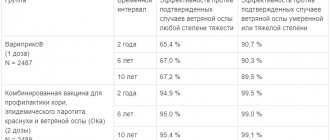In light of recent events with coronavirus, Rospotrebnadzor has become much more likely to immediately suspend the activities of companies for non-compliance with sanitary standards and rules. And lack of vaccination among workers may also be a reason for this.
But not all organizations and not all employees require them. In what cases such a need arises, we will examine in this article. I will leave samples of documents and if you have any questions or have anything to add about the text, write in the comments, this is important both for the author and for other readers.
So, let's start to figure it out.
Vaccination of employees
For some organizations, it is the employer’s responsibility to vaccinate certain categories of employees, and if vaccinations are not done, then you, as an occupational safety specialist, are obliged to suspend the employee.
But I know quite a lot of people who are skeptical about vaccination and always write a refusal.
Because on the basis of paragraph 1 of Art. 5 Federal Law No. 157 provides for the right of any person in the Russian Federation to refuse professional vaccinations.
Then a logical question arises: “On what basis will the employer dismiss?” It turns out he has no right to demand and force his employee.
But if you follow this path, the consequences can be extremely severe, because at the very first inspection by Rospotrebnadzor, you will receive an order and more.
And such situations are not uncommon, and vaccinations are required for public catering workers, and if a violation is detected, then Rospotrebnadzor has every right to remove staff from work and suspend the organization’s activities.
To avoid getting into trouble, it is better to understand when mandatory vaccination of workers is required and for which organizations.
You can watch a short and succinct video about who is required to get vaccinated, and I will also leave a link to my YouTube channel, where you can learn a lot of useful information on occupational safety.
Employer's liability
If the employer does not comply with the requirements of the law and mandatory vaccination of employees is not carried out, then he will be brought to administrative responsibility (Article 6.3 of the Code of Administrative Offenses of the Russian Federation).
Fines vary depending on the field of activity, and range from approximately 20 to 80 thousand rubles, but this article also gives Rospotrebnadzor the opportunity to suspend activities for up to 90 days.
Flu vaccination
The disease is an acute respiratory infection that affects the human respiratory tract. It differs mainly by its aerosol propagation mechanism. That is, through inhalation of particles of infected mucus or saliva. The flu periodically spreads at a faster rate, turning into an epidemic. It is particularly dangerous because it often develops into pneumonia – a deep inflammation of the lung tissue, which poses a serious threat to people’s lives.
The need to vaccinate catering workers is due to the fact that they work in crowded places. This significantly increases the risk of infection or, conversely, transmission of the pathogen from them to other people. In any case, this leads to an increase in the rate of spread of infection. Therefore, the sanitary and epidemiological service puts forward strict requirements for mandatory regular vaccination against influenza for catering staff. The recommended time for its annual holding is early autumn.
Full range of labor protection, civil defense and emergency services
Enter your phone number and I will calculate an estimate for your tasks. Enter without the eight. “Bureau of Ekaterina Vorontsova” – professional solutions to your problems: with high quality and on time!
Vaccinations for employees | Justification of the obligation
Yes, many can say that the employer is obliged to provide safe working conditions for his employees (Article 22, Article 212 of the Labor Code), but the population must also be confident not only in quality, but also in safety (Article 11, Article 24 , Article 32 No. 52-FZ).
It turns out that the situation is controversial, and the employer does not have the right to force employees to get vaccinated, but is obliged to take part in immunization.
But the employer has the powers granted by Part 2 of Art. 5 No. 157-FZ. Due to the lack of preventive vaccinations, citizens can be refused employment or suspended from performing duties, but only those that are associated with a high risk of contracting and spreading infectious diseases.
For this purpose, a list of jobs has been developed where the employer is obliged to monitor the vaccinations of its employees, because there is a risk of the occurrence and spread of infectious diseases and that is why preventive vaccination of employees is necessary. (RF Government Decree No. 825).
List of works required for vaccination:
An employer whose employees are included in this list must necessarily use the national calendar of preventive vaccinations and the vaccination calendar for epidemic indications (Order of the Ministry of Health No. 125n)
This is necessary because the list of works and the vaccination calendar complement and clarify each other, which categories of workers should receive them.
It contains clarifications:
- What categories of workers are required to be vaccinated?
- Up to what age is it permissible to vaccinate?
- Frequency of immunoprophylaxis.
- What vaccinations are required for employees?
That is, to take and vaccinate all employees, for example, of medical institutions, and in case of refusal you do not have the right, you should make sure that employees are included in the list and calendars of professional vaccinations and according to epidemiological indications.
If in doubt, check with Rospotrebnadzor.
And these are, as a rule, contacts, that is, be extremely careful when making a list of positions, the issue is quite complex and if you remove an employee who is not entitled to it, he can easily be reinstated through the court.
Decree on mandatory vaccination against coronavirus
From June 16 in Moscow, Moscow region* in order to implement the resolution of the Chief State Sanitary Doctor for the city of Moscow dated June 15, 2021 No. 1 “On carrying out preventive vaccinations for certain groups of citizens for epidemic indications” (hereinafter referred to as the resolution of the Chief State Sanitary Doctor for the city Moscow) introduced mandatory vaccination against coronavirus for employees and performers under civil contracts for individual entrepreneurs and legal entities operating in the following areas:
- trade;
- beauty salons, cosmetics, SPA salons, massage salons, solariums, baths, saunas, fitness centers, fitness clubs, swimming pools;
- household services, including laundries, dry cleaners and other similar services;
- Catering;
- client divisions of financial organizations, organizations providing postal services;
- multifunctional centers for the provision of state and municipal services;
- public transport, taxi;
- education, health, social protection and social services;
- housing and communal services and energy;
- cultural, exhibition, educational events (including museums, exhibition halls, libraries, lectures, trainings), with the exception of official events organized by executive authorities;
- leisure, entertainment, entertainment events (including gaming events, master classes);
- children's playrooms, children's entertainment centers, children's day camps, and other places where similar events are held for minors in buildings, structures, structures (premises in them), including in cultural and recreation parks, shopping and entertainment centers;
- theaters, cinemas, concert halls;
- mass physical education and sports events.
Also, vaccination against coronavirus is mandatory for state civil servants holding positions in the state civil service of the city of Moscow, municipal employees filling positions in the municipal service of the city of Moscow, employees of the authorities of the city of Moscow and organizations subordinate to them.
According to paragraph 2. of the resolution of the Chief State Sanitary Doctor for the city of Moscow, the heads of organizations and individual entrepreneurs operating in the territory of the city of Moscow in the specified areas:
- before July 15, it is necessary to organize preventive vaccinations with the first component or a single-component vaccine, and before 08/15/2021 - with the second component of the vaccine against a new coronavirus infection that has passed state registration in the Russian Federation, for at least 60% of the total number of workers and employees;
- Strengthen awareness-raising efforts among workers and employees on the prevention of the new coronavirus infection (COVID-I9), paying special attention to the need for preventive vaccinations.
According to the decree of the Mayor of Moscow dated June 16, 2021 N 32-UM “On amendments to the Decree of the Mayor of Moscow dated June 8, 2021 N 68-UM” in the period from July 1, 2021 to July 15, 2021, the heads of organizations in the city. Moscow** must report on the progress of vaccination of their workers. Information in the prescribed form (Appendix No. 2 to the decree of the Mayor of Moscow dated June 16, 2021 No. 32-UM) indicating the employee’s SNILS, his compulsory medical insurance policy, the passport or patent number of the foreign worker, as well as the mobile phone number. This information is sent electronically using the personal account of a legal entity or individual entrepreneur on the official website of the Mayor and the Moscow Government.
Legal justification for “voluntary-compulsory” vaccination:
In the Russian Federation there is no term “forced vaccination”. The Law “On Immunoprophylaxis” states that anyone can refuse vaccination; it is voluntary. The Constitution of the Russian Federation contains the concept of medical confidentiality. Vaccination is a personal matter of the citizen; according to the law, it is impossible to collect this information (there is a list of exception professions where vaccination against various diseases is required according to the type of service, for example, teachers, while trade employees are not included in this list).
Decree of the Government of the Russian Federation dated July 15, 1999 No. 825 approved a list of works, the performance of which is associated with a high risk of contracting infectious diseases and requires mandatory preventive vaccinations. - Persons who provide them can be required to be vaccinated. By order of the Ministry of Health of the Russian Federation dated December 9, 2020 No. 1307n, vaccination against coronavirus infection caused by the SARS-CoV-2 virus was included in the calendar of preventive vaccinations for epidemiological indications. If employees classified as the 1st level priority of these categories from the order of the Ministry of Health (for example, employees of healthcare, educational organizations) do not get vaccinated, they can be suspended from work without pay.
What about the rest of the employees? The Labor Code contains a closed list of grounds for dismissal; the employer does not have the right to dismiss employees who do not want to be vaccinated. BDO experts consider the legality of mandatory vaccination for those who are not on the list of Government Decree No. 825 to be questionable.
Risks for the Employer:
For failure to comply with the resolution of the Chief State Sanitary Doctor for the city of Moscow, the employer may be held accountable. In this case, those “covid” articles of the amendments made to the Administrative Code in 2021 are quite applicable (Administrative Code of the Russian Federation, Article 20.6.1. provides for a fine for legal entities from 100 thousand to 300 thousand rubles, including suspension of the organization’s activities for a period up to 90 days).
Recommendations from BDO Unicon Outsourcing experts on meeting the requirements of the Decree of the Chief State Sanitary Doctor for the city of Moscow and the Moscow region and the Decree of the Mayor of Moscow dated June 16, 2021 N 32-UM “On amendments to the Decree of the Mayor of Moscow dated June 8, 2021 N 68-UM ":
1.
Approve an internal local document (order/directive) on organizing the procedure for carrying out preventive vaccinations for epidemic indications against the new coronavirus infection (COVID-19). In the preamble of the Order, be sure to make a reference to the need to comply with the requirements of the resolution of the Chief State Sanitary Doctor for the city of Moscow and the Decree of the Mayor of Moscow dated June 16, 2021 N 32-UM “On amendments to the Decree of the Mayor of Moscow dated June 8, 2021 N 68-UM "
The order recommends appointing a person responsible for providing information within the established time frame on fulfilling the requirements of the resolution of the Chief State Doctor for the city of Moscow in accordance with the established form of Appendix No. 2 of the Decree of the Mayor of Moscow dated June 16, 2021 N 32-UM “On amendments to the Decree of the Mayor of Moscow dated June 8 2021 N 68-UM.”
Prepare sheets for employees to familiarize themselves with the order and/or make a general mailing to employees via email, adding settings to provide a report on letter delivery and reading.
2.
Conduct awareness-raising work with employees and tell them about the need for vaccination:
- Personalized email newsletter with information about the dangers of coronavirus;
- Gather your employees for a meeting. If you invite a medical representative (infectious disease specialist, pulmonologist, therapist) to the meeting, he, as a specialist, will explain the pros and cons of the vaccine.
3.
Decide on the most appropriate method of vaccination in the company:
There are several ways to vaccinate employees:
- send employees to state medical clinics under compulsory medical insurance (will not entail financial costs on the part of the Employer);
- send employees to private clinics under VHI. Vaccination against COVID-19 is not included in the VHI program, but it can be included in insurance coverage for an additional fee;
- enter into an agreement with a licensed vaccination center that provides on-site services, or with clinics and medical centers that have access to the vaccine.
4.
Prepare a personal Notification for each employee (including performers under GPC agreements) about the organization of the vaccination procedure in the company with a request (we recommend excluding wording that forces employees to carry out the assignment without fail***) to inform if the employee has already undergone the vaccination procedure ( To confirm the fact, ask for a vaccination passport) or inform if there are medical contraindications to vaccination against coronavirus.
In the notification, be sure to indicate the timing of vaccination (until July 15, 2021 - the first stage, until 08/15/2021 - the second stage of vaccination) and general information on the vaccination procedure (methods of self-registration, general restrictions, addresses of vaccination points, etc. ). To prepare this information, you can refer to the website of the Moscow Mayor - https://www.mos.ru/city/projects/covid-19/privivka/.
5.
Calculate 60% of the actual number of employees who should get vaccinated.
When counting employees, we take into account not the average number of employees, but the actual number of employees, including part-time workers, as well as performers under civil contracts. There are no restrictions for employees who work remotely, it is understood that they must also be vaccinated. Do not exclude employees who have contraindications to vaccination from the total number. Do not include in the total number of employees who work in separate divisions in other regions.
Thus, calculate 60% using the formula:
Number of employees to calculate 60 percent for vaccination = (All employees and performers under the GAP - Employees and performers under the GAP who work outside of Moscow) x 60%
6.
If employees refuse to be vaccinated, request written notice of refusal. In our opinion, the presence of supporting documents will reduce the risks for the Employer in case of questions from supervisory authorities.
7.
Provide information on the implementation of the Decree of the Mayor of Moscow** dated June 16, 2021 N 32-UM “On amendments to the Decree of the Mayor of Moscow dated June 8, 2021 N 68-UM.” Fill out the data in accordance with the form of Appendix No. 2 of the Decree, period - from July 1 to July 15, 2021. Consultations regarding the provision of information are carried out by phone:
+
.
* - the vaccination requirement was approved by Resolution of the Chief State Sanitary Doctor for the Moscow Region dated June 16, 2021 No. 3.
** — Employers in the Moscow region send information in the form specified in the appendix of the Decree of the Governor of the Moscow Region dated June 16, 2021 No. 184-PG. Duration: from July 1 to July 15, 2021.
*** - Resolution
No. 825 of approved a list of works and types of services - the persons who perform them and who can be required to be vaccinated.
Documents for mandatory vaccination
The organization prepares a free-form order on the need to undergo mandatory vaccination with a list of employees, or prepares a written notification with which employees must be familiarized.
If everyone agrees, then voluntary consent must be formalized, it is possible.
And if you find out about an employee’s refusal to be vaccinated, you must request a written one, and then the procedure begins for suspension from work without pay (Article 192 of the Labor Code of the Russian Federation and Article 76 of the Labor Code of the Russian Federation) or transfer to another position where vaccination of employees is not required .
Can an employee be fired for refusing vaccination?
Dismissal at the initiative of the employer may be applied as a disciplinary sanction on appropriate grounds.
Refusal to vaccinate may be considered as failure to fulfill his labor duties through the fault of the employee in cases where:
- refusal without a good reason : the employee knows about the obligation to get vaccinated, without explaining the refusal or avoiding vaccination, or the employee knows that the employer has created appropriate conditions for immunization and avoids it
- the employer created the conditions for vaccination - set aside a day, organized the procedure at the place of work or transport of employees to a medical facility, while maintaining average earnings.
If the above conditions are met, the employer is obliged to order the removal of the employee and has the right to simultaneously impose a disciplinary sanction in accordance with Art. 192 of the Labor Code.
Main conclusions
If your organization is included in the list of jobs and categories of employees that are subject to preventive vaccination, then it is necessary to monitor not only the presence of the corresponding mark in the personal medical record, but also compliance with frequency.
All this information is presented in detail in the national calendar of preventive vaccinations and vaccinations for epidemiological indications.
Vaccination is free of charge for both employees and employers, financed through government programs. But if the employer wants, he can enter into an agreement with a medical institution and purchase more expensive vaccines for his staff.
Both in case of consent and in case of refusal of vaccination, the employee must provide the relevant document:
- Voluntary consent.
- Written refusal.
If the employee is against it, it is necessary to arrange a transfer to another position or apply disciplinary measures.
The issue of compulsory vaccination is quite complex and controversial. Read the legal regulations carefully, because if the employee did not need it, and you remove him from work, he can go to court.
I wish you safe and efficient work!
If you have any questions, write them in the comments, discussion is welcome!
How can managers implement immunization requirements in practice?
Constantly explaining the importance of compliance with them and the need to independently monitor implementation each time can take a lot of time and effort. The following steps will help simplify the procedure and attract employees’ attention to the importance of the issue:
- Arrangement of a corner on occupational safety with materials directly related to the importance of vaccinations.
- Ordering booklets and posters with a clear demonstration of the dangers of infections and their consequences, placing materials near workplaces.
- Inclusion in the employment contract of a special clause on compulsory immunization.
- Organizing conversations and meetings with staff about the importance of disease prevention and reputational risks in case of violation of sanitary standards.
- Familiarization of employees with the results of a special labor assessment commission regarding the state of their jobs.










